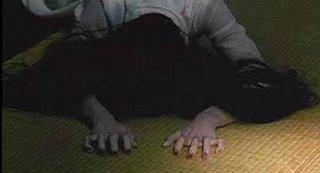 The movie opens with an image of water - dark, rolling waves pulling slowly back. Cut to two girls chatting in a typical teen bedroom - one tells a story she heard about some kids that, after watching a TV show got a message saying they'd die in seven days. The other girl, Tomoko, freezes; she demands to know where she heard the story. Shaken, she then tells her own story: she and a few friends went up to a cabin for the weekend and watched a mysterious videotape, followed by a phone call saying they'll die in seven days. After a tense moment, Tomoko giggles to relieve the tension. All seems fine until the phone rings...
The movie opens with an image of water - dark, rolling waves pulling slowly back. Cut to two girls chatting in a typical teen bedroom - one tells a story she heard about some kids that, after watching a TV show got a message saying they'd die in seven days. The other girl, Tomoko, freezes; she demands to know where she heard the story. Shaken, she then tells her own story: she and a few friends went up to a cabin for the weekend and watched a mysterious videotape, followed by a phone call saying they'll die in seven days. After a tense moment, Tomoko giggles to relieve the tension. All seems fine until the phone rings... RINGU plays with many different conventions, and is a classic example of what is now commonly referred to as "J-Horror" - films that come out of Japan (and now other Asian countries) focusing on dread, ghosts, and unrepentant evil from the past, among other things. Director Hideo Nataka plays the opening with maximum tension, using a studied knowledge of teen behavior and movie horror to set the scene correctly. He does this with small flourishes - the phone call that turns out to be nothing more than a concerned parent, the careful disarray of clothing as the police examine another murder scene - this time two kids who died at exactly the same moment in a parked, locked car.
RINGU plays with many different conventions, and is a classic example of what is now commonly referred to as "J-Horror" - films that come out of Japan (and now other Asian countries) focusing on dread, ghosts, and unrepentant evil from the past, among other things. Director Hideo Nataka plays the opening with maximum tension, using a studied knowledge of teen behavior and movie horror to set the scene correctly. He does this with small flourishes - the phone call that turns out to be nothing more than a concerned parent, the careful disarray of clothing as the police examine another murder scene - this time two kids who died at exactly the same moment in a parked, locked car.One of the great things about the beginning of the movie is exactly how the story of the cursed videotape is told - as reporter and heroine Asakawa listens to different school girls tell their versions, we are witness to the creation of urban legend - nothing is completely correct, yet all version hold grains of fact to be nurtured into an ultimately terrifying truth.
 As Asakawa and her ex-husband Ruyji race to decipher the meaning of the video and the means to end their own impending doom, Nataka again balances the terror and the relationship between the two protagonists. The horror and tension that occurs works precisely because we grow to care about these two people - their entire time together the repressed feeling that lay in their divorce are constantly threatening to stop simmering and come to the surface.
As Asakawa and her ex-husband Ruyji race to decipher the meaning of the video and the means to end their own impending doom, Nataka again balances the terror and the relationship between the two protagonists. The horror and tension that occurs works precisely because we grow to care about these two people - their entire time together the repressed feeling that lay in their divorce are constantly threatening to stop simmering and come to the surface.The use of sound and repeated images (reflections in the television, the long dark hair, etc...) add to the suspense. And what about the famous ending? I've found few things that have been as disturbing. If you've never seen the movie before and walked in not knowing what was going to happen, you'll never guess what awaits.
Completely satisfying, with a nod to THE TERMINATOR at the very end that leaves you feeling with a sense of dread you'll carry for a while after the television shuts off.

No comments:
Post a Comment